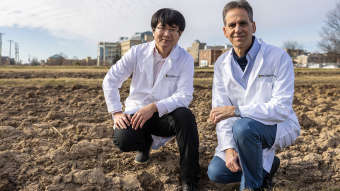Dec. 2, 2020
Contact: Pate McCuien, 573-882-4870, McCuienP@missouri.edu
Why don’t my relationships ever work out? Will I ever find a person who is right for me? Prior to taking a healthy relationship workshop with ShowMe Healthy Relationships last year, Tamieka Johnson often found herself asking these common questions. Her past relationships left her feeling hurt and stuck.
“I enrolled in the class because I wondered if it would help me figure out why I keep choosing Mr. Wrong and maybe gain insight on how to find Mr. Right,” she said. “I believed that relationships were hard and stressful and that I had to do what the guy wanted for them to work.”

Directed by Chelsea Garneau-Rosner, an assistant professor within the MU Department of Human Development and Family Science in the College of Human Environmental Sciences, the program has provided training in healthy relationship skills to 1,127 adult couples and 1,770 singles, including Johnson, across Missouri since 2015. Because of the program’s success so far, the college was awarded a new 5-year, $6.24 million research grant from the Administration for Children and Families to continue this work.
The new grant will focus on reaching single adults who want healthier romantic relationships in the future. Participants in the 8-week program will learn qualities that make a good partner, how to communicate and maintain a partnership, and how topics like parenting, finances and personal well-being are related to healthy relationship choices. The researchers aim to enroll 2,800 adults and follow them for 12 months after completing the program to learn more about the longer-term impacts on their future relationship experiences.

Melissa Herzog, an assistant teaching professor within the MU Department of Human Development and Family Science, oversees the effort to track the impact of ShowMe Healthy Relationships. She said the program aims to help adults avoid unhealthy relationships and promote stability among Missouri families in the long term. She emphasized that this community education approach offers a less intensive alternative to some traditional interventions, such as individual or family therapy.
“We do prevention,” Herzog said. “Reaching people in between relationships is the best time to help them learn skills that promote happier, healthier future relationships. These classes go a long way in preventing basic relationship problems and more serious unhealthy situations, such as abuse, from occurring in the first place.”
However, ShowMe Healthy Relationships offers more than an opportunity to learn from the program’s experienced facilitators. Participants gain helpful insight by getting to know each other during classes and learn from other’s experiences. Nikki Monnig is a Jefferson City resident who enrolled in the class after her fiancé passed away. She says she learned a lot from the other participants.
“I enjoyed the diversity of the class most. All of us were just different people that made different choices that are all on the same path toward healthy relationships,” Monnig said. “Having some support and hearing other people’s stories, helps you realize that most relationships aren’t easy and sometimes we need support and education to help improve them.”

The team works in collaboration with several partner organizations across the state. Garneau-Rosner said the partners have helped increase the program’s reach to 23 Missouri counties.
“By leveraging existing resources in the state, we make this incredible program available to as many families as possible,” Garneau-Rosner said. “With the expertise of our team, in our department and in our college, we are uniquely situated to provide the best type of this kind of programming in the state.”
In addition to improving adults’ relationships and supporting family stability, Garneau-Rosner said another goal of the program is to increase awareness of and access to healthy relationship education and educate stakeholders and community members on the importance of relational health as an overlooked component of public health. The grant funding allows workshops to be offered at no cost to the participants, thus the project aims to especially engage adults and families who have fewer economic resources and may not otherwise have access to such services.
Classes will be offered beginning in April 2021. Interested individuals can get involved with ShowMe Healthy Relationships by contacting the community partner nearest them. For more information, visit www.showmehealthyrelationships.com or contact Miriam Cullimore, Project Manager, at cullimorem@missouri.edu.



